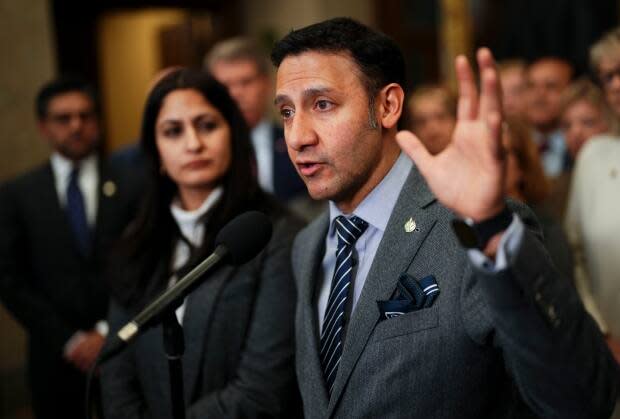Experts urge federal government to pursue moderate, 'judicious' approach to harmful content online

Digital policy experts say the Liberal government should be restrained when it comes to formulating its promised legislation governing online harms.
In an interview on CBC Radio's The House that aired Saturday, Emily Laidlaw, an associate professor at the University of Calgary, said the federal government faced a major challenge in crafting a bill that was technically viable and did not overstep itself.
"It's really hard legislation to write," Laidlaw, who holds the Canada research chair in cybersecurity law, told host Catherine Cullen.
"No matter where you turn this raises issues of freedom of expression. Some of the solutions are actually technical solutions and so it's hard to get it right. It takes quite a bit of effort and finessing and not everyone's going to agree on the final result."
The federal Liberals under Justin Trudeau have long promised legislation to help deal with the issue of online harms, which can include a wide array of issues, from harassment to child sexual exploitation.
Earlier this week, The Canadian Press reported the government is also looking to ensure the legislation covers exploitative deepfakes, such as the recent images of Taylor Swift which received global attention — including from the White House — in January.
"Keeping our kids and young people safe online is a legislative priority for our government — especially given the evolving capabilities of AI," Justice Minister Arif Virani said in an emailed statement to the Canadian Press.
He singled out deepfakes as content that can "exacerbate forms of online exploitation, harassment and cyberbullying."
A previous version of the online harms legislation, introduced shortly before the 2021 election, was met with strong criticism from a range of interested parties.
Potential shift in approach
The concept of the legislation is not popular with Conservative Leader Pierre Poilievre, who has consistently accused the Liberal government of overreach and censorship, saying the government "cannot differentiate between hate speech and speech they hate."
But Laidlaw says there's hope the government has reimagined its approach to the issue, away from a "takedown model" and toward a "duty of care" approach.
"My biggest fear at the moment is that the second this bill is introduced, it's going to be positioned as the saviour of the internet," Laidlaw said. "If this is done well, it's actually going to be relatively narrow. It's not going to solve all the problems of online harms."

Matt Hatfield, executive director of the advocacy group OpenMedia, agreed that the first version of the government's legislation would not have ended well.
"There were a lot of very serious issues with that proposal at that time. It took a very simplistic, very punitive approach that I think would have led to the removal of a lot of lawful content," he said.
"I really hope that they have a judicious bill that addresses some of the most easy to address content very directly and establishes a regulator who can enforce transparency on platforms and give us more information about what's going on on them — which maybe will justify further legislation in the future."
Hatfield said he worried about "how much [the government] actually learned" from more extensive consultation pursued during the development of this newer legislation.
The Canadian push for online harms legislation is part of a broader international push to regulate social media companies. The federal government has already clashed with major tech companies over its online news legislation.
Meta, the parent company of Facebook and Instagram, recently said that it would restrict teens from seeing content related to suicide, self-harm and eating disorders.
"Internet companies should be accountable for enforcing standards on harmful content. It's impossible to remove all harmful content from the internet, but when people use dozens of different sharing services — all with their own policies and processes — we need a more standardized approach," CEO Mark Zuckerberg wrote in 2019.
"I think done right, this bill could do more good than either the [government's Streaming Act or Online News Act]," Hatfield said.
"Done wrong, it could do considerably more harm. And so I think this is just so important to get right."


